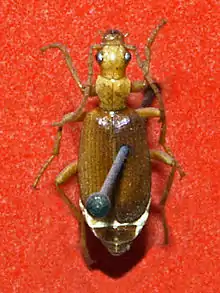| Brachinus crepitans | |
|---|---|
 | |
| Museum specimen | |
| Scientific classification | |
| Domain: | Eukaryota |
| Kingdom: | Animalia |
| Phylum: | Arthropoda |
| Class: | Insecta |
| Order: | Coleoptera |
| Family: | Carabidae |
| Genus: | Brachinus |
| Species: | B. crepitans |
| Binomial name | |
| Brachinus crepitans | |
| Synonyms[1] | |
| |
Brachinus crepitans is a species of ground beetle in the Brachininae subfamily that can be found in Europe, central Asia, the Middle East, and northern Africa.[2]
Etymology
The name of the species derived from a Latin word which means crackle because it makes crackling noise.[3]
Description
Brachinus crepitans can reach a length of 7–10.2 millimetres (0.28–0.40 in), with an average of 8 millimetres (0.31 in).[1][3] Head and protum are brown, while elytrae are greenish. The species is very similar to Brachinus efflans.
Distribution
Ukrainian distribution
In Ukraine the species is found in the steppes of Lviv, near Osovitsa village of Podolian Province in western Ukraine. It is also found in Zolochiv, Kharkiv Oblast.[1]
UK Distribution
The species can be found in southern England and southern Wales where it is abundant in coastal areas. The inland locations have been sited as well through, the most recent of which are Cotswolds and Northamptonshire where it was discovered in limestones. It was also found in boulder clay in Huntingdonshire, and in Brotheridge Green, an old railway line and wildlife reserve that was located near Malvern, Worcestershire. The species was found in the 1970s by Ian L. Crombie.[4]
Ecology
_(2882259854).jpg.webp)
The species fly from May to June. The lifecycle is not known but the larvae are thought to be external parasites that feed on the pupae of other beetle species including Amara convexiuscula and a staphylinid beetle, Tasgius ater (Gravenhorst, 1802).[3]
When disturbed, the species shoot liquid from two glands through their anus. Since one of the glands contains hydrogen peroxide and the other hydroquinone, when two the contents mix with enzymes in a "firing chamber", the liquid explodes, and harms the attackers.[3]
Habitat
The species can be found in dry and sunny areas, and usually under stones. It can also be found in calcareous grasslands, arable land, and chalk quarries.[3]
References
- 1 2 3 "Brachinus crepitans (Linnaeus, 1758)". Catalogue of Life. Retrieved 2023-04-08.
- ↑ "Brachinus (Brachinus) crepitans (Linnaeus, 1758)". 2.6.2. Fauna Europaea. August 29, 2013. Archived from the original on February 27, 2015. Retrieved October 20, 2013.
- 1 2 3 4 5 "Bombardier beetle (Brachinus crepitans)". ARKive. Archived from the original on 2012-08-24. Retrieved December 28, 2012.
- ↑ "Bombardier Beetle Brachinus Crepitans Found Near Honeybourne". WBRC. Retrieved December 28, 2012.